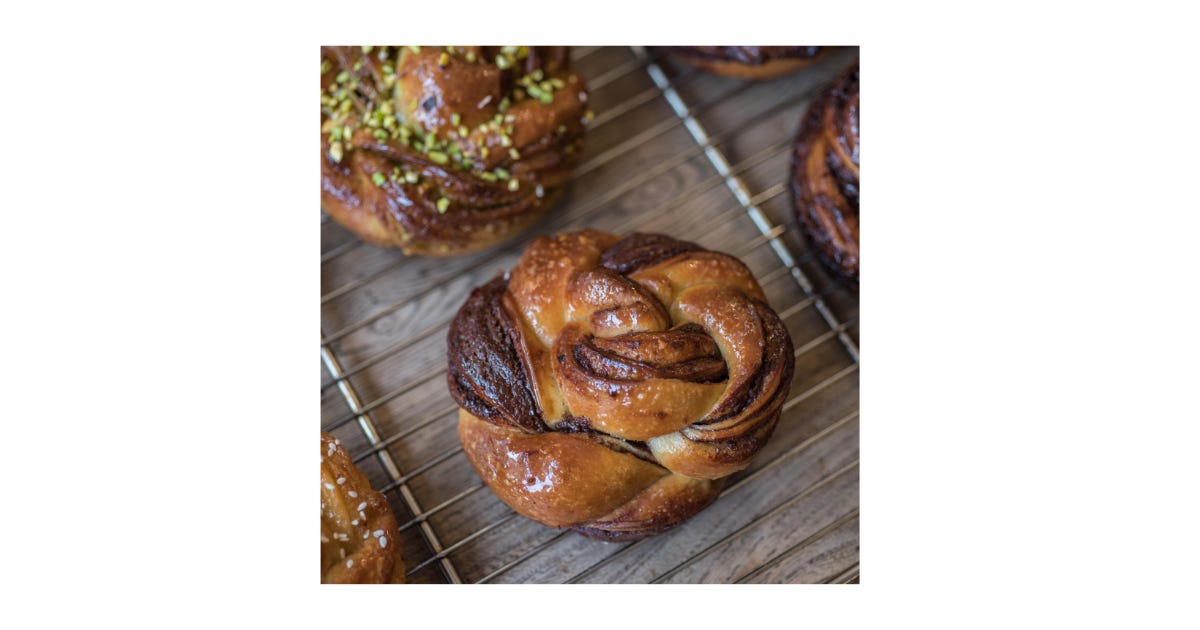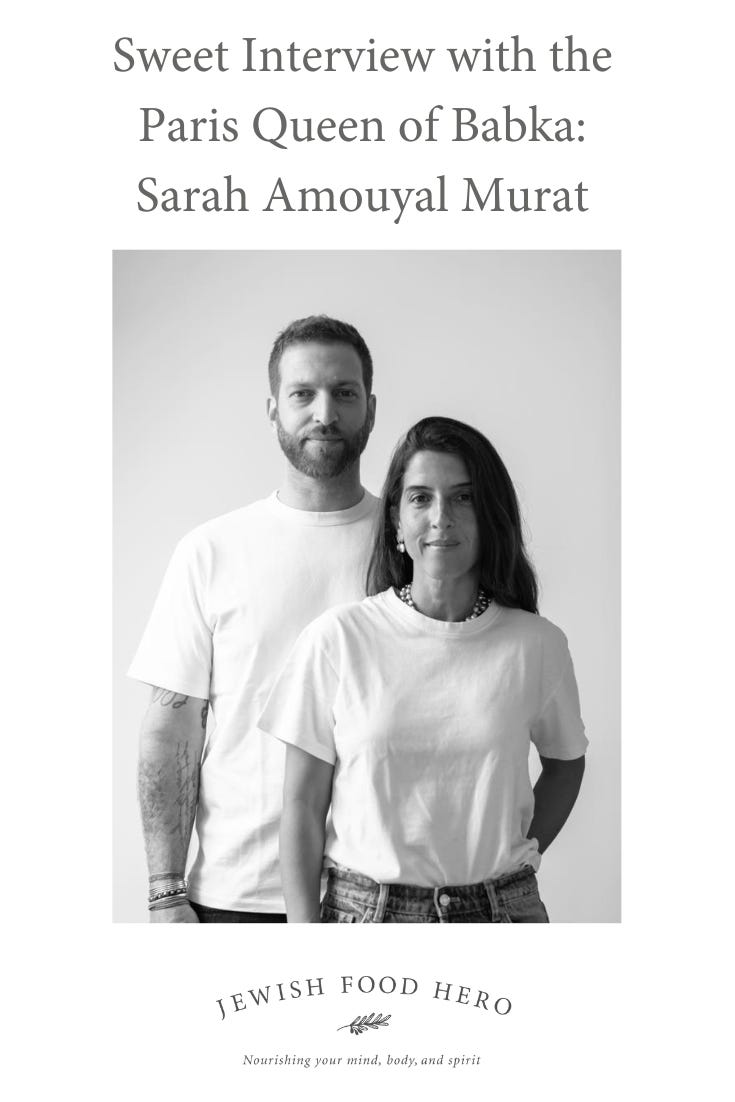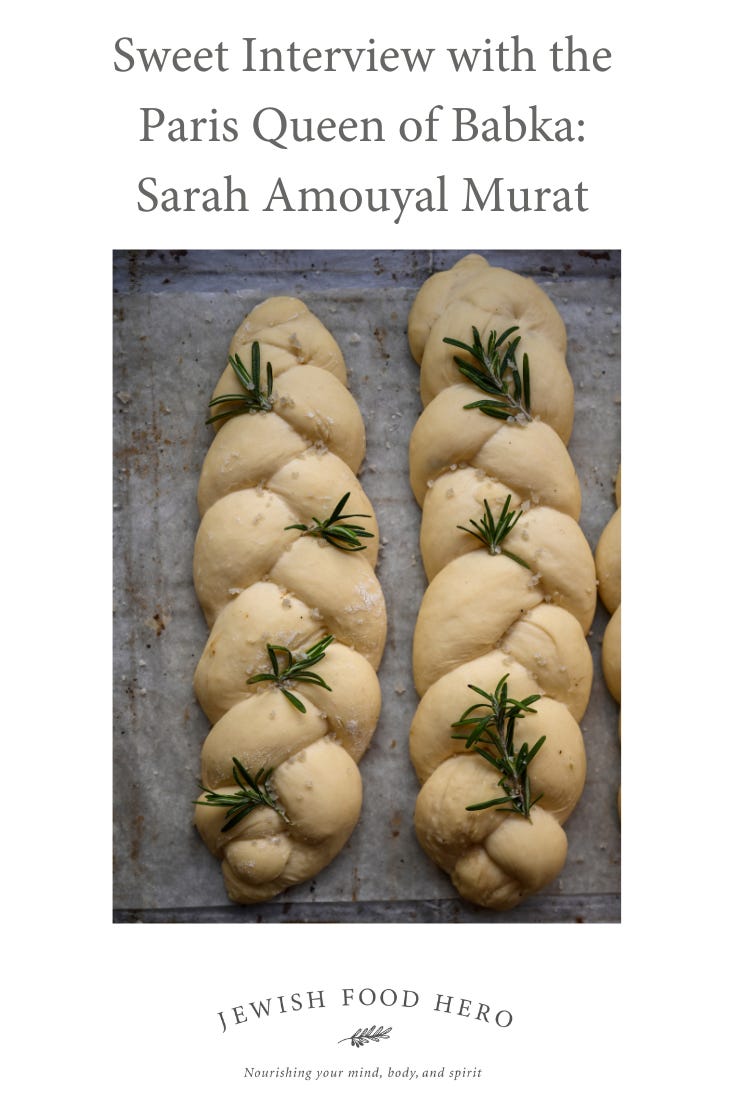🗼Paris Queen of Babka 🍞🍫: Sarah Amouyal Murat. A Sweet Interview
Next Email: Double Chocolate Babka Recipe (translated into English for the first time)
If only Babka could solve all the world's problems! 🌍🍰 Sigh, while it may not be the remedy for global challenges, my hope is that this interview (and babka recipe) with Sarah Amouyal Murat, the Paris Queen of babka and co-founder of Babka Zana Bakery, will feel like a joy-snack, a little escape to savor in the midst of your daily life.
In January 2020, Sarah and her husband, Emmanuel opened Babka Zana, a Levantine bakery in the 9th arrondissement of Paris that specializes in babka rolls & cakes, pies, pastries & sandwiches with Mediterranean flavors that they remembered from their childhood. A Levantine bakery refers to a bakery that specializes in the culinary traditions of the Levant, a region in the Eastern Mediterranean that includes countries like Lebanon, Syria, Jordan, Israel, and parts of Turkey and Cyprus. Levantine cuisine is known for its rich history, diverse flavors, and the use of fresh and local ingredients.
In 2022, Sarah published a beautiful cookbook Babka Zana: Boulangerie levantine, and shares her recipe for Double chocolate babka from this cookbook with us. This cookbook is not translated into English (yet!) so I have translated the recipe into English for us to make at home. The Babka recipe will arrive in your inbox tomorrow.
My wish is that this interview will feel like we are together at Babka Zana bakery in Paris with coffee and pastries with Sarah.
Before we do that, let’s do a Babka history primer:
Babka is a visually stunning enriched bread that hails from Eastern European Jewish culinary traditions. One of the defining features of babka is its characteristic swirled appearance, achieved by layering and twisting the dough. This technique not only contributes to its unique visual appeal but also allows for the incorporation of flavorful fillings. Traditional fillings include cinnamon, chocolate, nuts, and fruit preserves, providing a rich and indulgent taste.
The dough itself is typically made with ingredients like flour, sugar, eggs, and butter, resulting in a soft and tender texture. Babka can be shaped into loaves, rolls, or other creative forms, showcasing its versatility in presentation. After baking, the pastry is often glazed or dusted with powdered sugar, adding a final touch of sweetness.
The history of babka is deeply rooted in Eastern European Jewish culinary traditions, with its origins dating back several centuries. The word "babka" itself means "grandmother" in Polish and Ukrainian. Babka is believed to have evolved from a variety of sweet, yeast-based doughs that were popular in the region. The early versions of babka were likely simpler, made with basic ingredients like flour, water, and honey. Over time, Jewish bakers infused their cultural influences into the recipe, creating a distinct and beloved sweet bread.
As Jewish communities spread across the world, particularly during waves of migration in the late 19th and early 20th centuries, babka found its way into various culinary landscapes. Each region adapted the recipe to local tastes and ingredients, leading to different interpretations of this classic babka. Today, babka is not only a symbol of Jewish culinary heritage but has also become a beloved treat enjoyed by people around the world. Its enduring popularity speaks to the timeless appeal of this sweet and flavorful bread with a rich history.
So, grab your coffee or tea, get comfy, and let's dive into the delicious world of Parisien babka with Sarah Amouyal Murat!
Can you tell us a bit about yourself and how you got into the world of baking, especially specializing in Babka?
I am 42 years old, married to my husband Emmanuel, and a mother of two. Before the bakery, I worked in ready-to-wear fashion for 15 years. I have always been passionate about food, especially the Ashkenazi baking culture. My husband Emmanuel and I started baking babkas in the comfort of our home—for personal enjoyment and the joy of sharing with others.
What inspired you to focus on Babka in your bakery, and what makes it special in the context of Jewish cuisine?
The decision to center our bakery on Babka was sparked by the absence of such specialization in France until now. Babka is irresistibly charming, captivating both visually and gastronomically. Its allure transcends age, enchanting both the young and the old. The experience of indulging in Babka is akin to a gentle caress, effortlessly delightful. Primarily a brioche, Emmanuel and I recognized the endless creative possibilities in playing with diverse shapes and fillings, making it a truly enjoyable venture for us.
Babka comes in various flavors and styles. What are some of the unique or traditional variations you offer in your bakery?
At Babka Zana, our menu features four timeless babka classics, each with its unique flair:
Chocolate Hazelnut
Pistachio Orange Blossom
Lemon Halva
Cinnamon
In addition to our staple offerings, we introduce a monthly rotation of special babka flavors. These variations are inspired by the changing seasons and our culinary preferences, ensuring a delightful surprise for our customers with a new and exciting flavor every month.
How has Judaism influenced the recipes and flavors you incorporate into your baking?
The influence of our Judaism is deeply ingrained in the recipes and flavors featured in our bakery. We celebrate Ashkenazi and Sephardic baking cultures. Many recipes come from our family histories - our hallah, for example, is made from a recipe handed down from mother to daughter. Orange-scented Mouna - a sweet bread often associated with the Jewish community in North Africa, particularly in Morocco - has been on our festive tables since I was very young. Rugelach is a pastry that I have been eating since I was a child, from Tel Aviv to Jerusalem, at the market or in the local bakery. These experiences have shaped our commitment to preserving and sharing the rich tapestry of Jewish culinary traditions through our baking at Baba Zana.
Operating a bakery in Paris must bring its own set of challenges and opportunities. How do you tailor your offerings to cater to the local Parisian taste while maintaining the authenticity of Jewish pastries?
We were determined that our first bakery address would be in the 9th arrondissement of Paris, close to all the city’s best food establishments. So from the start, this compelled us to uphold a standard of excellence and demand quality from ourselves. It became a guiding principle, a constant motivation that persists to this day.
We believe babka is an ideal fusion-bread for Jewish and French cultures! At its core, babka is a brioche. Our approach focuses on the kind of finesse involved in making a Normandy brioche, which includes a lavish blend of butter and cream. To this base, we incorporate a medley of flavors and tastes. Our babkas are rooted in the history of Jewish baking, and appeal to the Parisian palette of today.
In what ways do you see your bakery contributing to or becoming a part of the local Jewish community in Paris?
From the outset, our bakery aimed to serve both the Jewish community and the broader Parisian community alike: a bakery for everyone. It brings us immense joy to witness a growing number of customers choosing our bakery for their Friday hallot. We are a kosher-friendly bakery, (without kosher certification), respecting certain kosher rules and regularly making creations for Jewish holidays.
Given the cultural appreciation for food in France, how do you think being in Paris has influenced your own eating habits, and does it play a role in the way you approach baking and enjoying pastries, including Babka?
Paris is a great city for gourmets, with all its master chocolatiers, pastry chefs and quality neighborhood bakeries. When we came up with Babka Zana, we had high standards in mind, not only because our first address is right in the heart of the 9th arrondissement, close to the best neighborhood bakeries, but also because we're the first place to specialize in babka.
With Emmanuel, every week we try out a new address that makes our mouths water, and in a way it pushes us and makes us want to go further in our creations. We're lucky to be in a city with wonderful addresses and French artisans who never cease to amaze us.
Through your bakery and the food you create, do you see yourself as a preserver of Jewish cultural traditions? How important is it for you to pass on these traditions through your work?
Transmitting cultural traditions is part of the essence of Babka Zana. Most of the recipes are family recipes which are passed on from mother to daughter. When we opened our first bakery, a lot of our customers did not know about some of our products such as hallah, rugelachs, mouna or even the babka. They did not know about trina or halva either. It is an honor for us to celebrate and make people discover products from the Middle East which inspire us daily for new creations.
For those who are passionate about baking and would love to try making Babka at home, what advice or tips would you give them to ensure they achieve the best results? Are there any specific techniques or secrets you've learned in your own baking journey that you'd be willing to share?
For baking enthusiasts eager to make Babka at home, I would emphasize the importance of patience, as the babka dough requires ample time to rest—ideally, a minimum of 24 hours in preparation. Additionally, using the highest-quality ingredients is crucial for achieving the best results. In my own baking journey, these principles of patience and quality have proven to be key factors in crafting a delicious and authentic Babka.
Working around delicious baked goods all the time, how do you personally approach the balance between indulgence and maintaining a healthy lifestyle?
Ha, Ha, that’s an interesting question! Tasting our baked goods is an essential part of the job - with two tasting sessions every week! I balance this by maintaining a healthy eating routine for the rest of the week: being mindful of my food choices to ensure I am not constantly indulging in rich or excessive foods. My focus is on enjoying the culinary creations I make while still being conscious of my overall health.
Given the rich pastry culture in Paris, we'd love to know your top recommendations for visitors seeking a sweet adventure. If someone is exploring the city and stops by your bakery, which other bakeries would you suggest they visit to experience the diverse and delicious world of Parisian pastries
I would suggest exploring the following four bakeries for a delightful and diverse journey into the world of Parisian pastries: Plaq, Union (cookies), Bontemps, Norma.
Plaq: 4 Rue du Nil, 75002 Paris
Artisan Chocolate that is made from the purest sourced cocoa beans.
Union Boulangerie 2 Rue Bleue, 75009 Paris
A neighborhood bakery renowned for their croissants in Paris, and adored by many for their cinnamon rolls.
Bontemps 57 rue de Bretagne, 75003 Paris
A cozy bakery and café in the Marais district, well-loved for tasty brunch options and delicious cakes that go perfectly with tea or coffee.
Norma 34 rue Notre-Dame-de-Lorette, 75009 Paris
An Anglo-Saxon inspired pastry shop and sandwich shop that specializes in leavened puff pastry pastries. Favorites include homemade focaccia, delicious cookies and decadent cakes
I hope reading this interview felt like a joy snack. I am sending out Sarah’s Double Chocolate Babka Recipe in a separate post! So keep an eye on your inbox.
Thank you as always for reading and sharing Jewish Food Hero posts with family and friends.
Am Yisrael Chai
Kenden

















